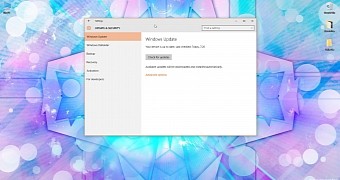Windows 10 launched on July 29, and since then Microsoft has already rolled out four different cumulative updates supposed to improve the overall performance of the operating system and fix some of the bugs reported by users prior to the release.
The last such update is KB3081444, which Microsoft introduced as a security patch for Internet Explorer and design to fix a critical flaw in the browser that can allow an attacker to get the same rights as the logged-in user.
KB3081444 is actually called “Cumulative update for Windows 10: August 18, 2015,” but in the official description of the patch that's posted on Microsoft's support page, the company says nothing more than the security fix we've told you above, while also making a short reference to “improvements in the functionality of Windows 10.”
What are these improvements? How are they making Windows 10 faster? What are the improved features?
These are the questions that users have submitted to us in the last couple of days, but Microsoft is yet to provide us with an answer.
What's in the latest update?
And yet, as Woody Leonhard of InfoWorld points out, there's a Reddit post that digs deeper in this patch and finds something interesting:
Here's what one of the users here found:
“If you look at the Build Kernel, MS actually updated the kernel code with this update (from registry):
“BuildLab REG_SZ 10240.th1.150810-2333 BuildLabEx REG_SZ 10240.16431.amd64fre.th1.150810-2333
“If you notice, the build is dated Aug 10 (150810), this is new with this update. So this cumulative update applied more than IE Vuln fix... And I would assume this to be the plan moving forward with all updates.”
In other words, Microsoft also hid some kernel updates in this new patch, in addition to the Internet Explorer security fix.
Microsoft remains surprisingly reticent on the updates that it releases for Windows 10 users and says almost nothing beside the fact that they are cumulative updates, which could make many wonder why all the secrecy?
Right now, the Windows as a Service approach is going great and updates do arrive at a faster pace than before, but Microsoft still needs to do this right. Keeping users informed about the things they install is vital and unless the company fixes this in the coming updates, it won't take long until it backfires.

 14 DAY TRIAL //
14 DAY TRIAL //